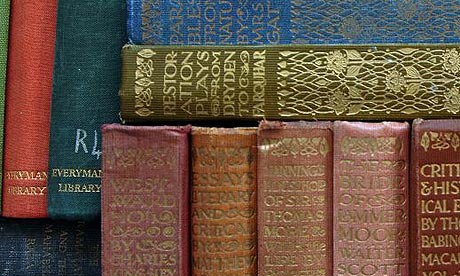
The advantage of shopping for secondhand books online, as many readers have expensively discovered, is that you can find what you're looking for. The advantage of shopping for them offline is that you find what you're not looking for – often, what you didn't even know existed.
If you are of my hesitant and miserly character, this serendipity brings into being a special category of books: the ones you have run across, with wonder, in a corner of some shop and never quite steeled yourself to buy. It is marvellous to discover, say, a book called The Nobility of Failure in the binding of the House of Lords library – the Oxfam bookshop in Strutton Ground, near Westminster, is a particularly rich place for this sort of find – but then it turns out to be priced for people interested in the subject (Japanese history, and something over £5, if I remember) rather than for people who might buy it as a joke. It will, of course, be gone the next time you visit.
Over time, I have assembled a shadow bookshelf of things picked up and put back down: an appropriately brown little volume on "Paper-Bag Cookery" (£3, Nottingham); a battered paperback anthology of "Angry Young Men" including Kingsley Amis's confession of faith in the Labour party (£4.50, Cheltenham); a 1947 Indian railway directory (£50, sadly, east Yorkshire); an early 1970s Time Out guide to London (50p, in a bargain bin).
It would not be too difficult to track down other copies of these on the internet. In many cases, it might not even cost more than surrendering to the original impulse. But I have come to suspect that some of these books are more valuable to me as shadows. Take the most recent example, in that Westminster Oxfam. It was the stray second volume of an elaborately printed 1920s memoir by a senior foreign-desk man on the Times. Opening it to a random page, I found something like this:
"Lord Northcliffe asked my opinion. 'I think it's a dirty international Jewish plot to keep us out of the war,' I said."
There was little chance of the rest of it living up to that, in either bigotry, shock value or high-level gossip content. If there were, it would probably be too vile to read. And I would have been starting at chapter 27, with a profusion of unexplained references and assumptions, and an index pointing to all the interesting things I had missed in Vol I – a shadow book within a shadow book. So I reshelved it, and left with the complete imaginary edition.
I have yet to change my mind and go back for that one – this was about a week ago – but I almost certainly will. It will almost certainly be gone. Will I be sorry? Yes. But there is a pleasure to be had in contemplating insignificant regrets. Having eventually coughed up for WH Auden's Collected Shorter Poems (£3.99, Beeston, Notts), I know he experienced it when buying railway tickets, because he described it in "A Permanent Way":
And what could be greater fun,
Once one has chosen and paid,
Than the inexpensive delight
Of a choice one might have made?

